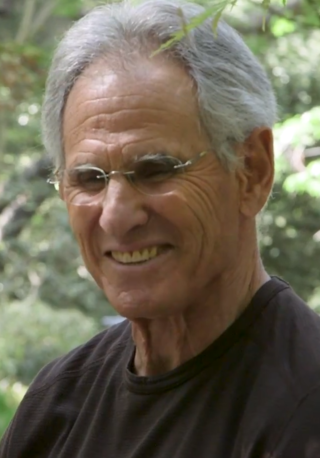Related Research Articles

Compassion is a social feeling that motivates people to go out of their way to relieve the physical, mental, or emotional pains of others and themselves. Compassion is sensitivity to the emotional aspects of the suffering of others. When based on notions such as fairness, justice, and interdependence, it may be considered partially rational in nature.
In psychology, introjection is the unconscious adoption of the thoughts or personality traits of others. It occurs as a normal part of development, such as a child taking on parental values and attitudes. It can also be a defense mechanism in situations that arouse anxiety. It has been associated with both normal and pathological development.
Henry Pierce Stapp is an American mathematical physicist, known for his work in quantum mechanics, particularly the development of axiomatic S-matrix theory, the proofs of strong nonlocality properties, and the place of free will in the "orthodox" quantum mechanics of John von Neumann.
The Hakomi Method is a form of mindfulness-centered somatic psychotherapy developed by Ron Kurtz in the 1970s.
Mindfulness is the cognitive skill, usually developed through meditation, of sustaining meta-awareness of the contents of one's own mind in the present moment. Mindfulness derives from sati, a significant element of Hindu and Buddhist traditions, and is based on Zen, Vipassanā, and Tibetan meditation techniques. Though definitions and techniques of mindfulness are wide-ranging, Buddhist traditions describe what constitutes mindfulness such as how past, present and future moments arise and cease as momentary sense impressions and mental phenomena. Individuals who have contributed to the popularity of mindfulness in the modern Western context include Thích Nhất Hạnh, Joseph Goldstein, Herbert Benson, Jon Kabat-Zinn, and Richard J. Davidson.
In some schools of popular psychology and analytical psychology, the inner child is an individual's childlike aspect. It includes what a person learned as a child before puberty. The inner child is often conceived as a semi-independent subpersonality subordinate to the waking conscious mind. The term has therapeutic applications in counseling and health settings. The concept became known to a broader audience through books by John Bradshaw and others.

Jon Kabat-Zinn is an American professor emeritus of medicine and the creator of the 'Stress Reduction Clinic' and the 'Center for Mindfulness in Medicine, Health Care, and Society' at the University of Massachusetts Medical School. Kabat-Zinn was a student of Zen Buddhist teachers such as Philip Kapleau, Thich Nhat Hanh, and Seung Sahn, and a founding member of Cambridge Zen Center. His practice of hatha yoga, Vipassanā and appreciation of the teachings of Soto Zen and Advaita Vedanta led him to integrate their teachings with scientific findings. He teaches mindfulness, which he says can help people cope with stress, anxiety, pain, and illness. The stress reduction program created by Kabat-Zinn, mindfulness-based stress reduction (MBSR), is offered by medical centers, hospitals, and health maintenance organizations, and is described in his book Full Catastrophe Living.

Richard Price was co-founder of the Esalen Institute in 1962 and a veteran of the Beat Generation. He ran Esalen in Big Sur for many years, sometimes virtually single-handed. He developed a practice of hiking the Santa Lucia Mountains and developed a new form of personal integration and growth that he called Gestalt Practice, partly based upon Gestalt therapy and Buddhist practice.
The Internal Family Systems Model (IFS) is an integrative approach to individual psychotherapy developed by Richard C. Schwartz in the 1980s. It combines systems thinking with the view that the mind is made up of relatively discrete subpersonalities, each with its own unique viewpoint and qualities. IFS uses systems psychology, particularly as developed for family therapy, to understand how these collections of subpersonalities are organized.
Mindfulness-based cognitive therapy (MBCT) is an approach to psychotherapy that uses cognitive behavioral therapy (CBT) methods in conjunction with mindfulness meditative practices and similar psychological strategies. The origins to its conception and creation can be traced back to the traditional approaches from East Asian formative and functional medicine, philosophy and spirituality, birthed from the basic underlying tenets from classical Taoist, Buddhist and Traditional Chinese medical texts, doctrine and teachings.

Buddhism includes an analysis of human psychology, emotion, cognition, behavior and motivation along with therapeutic practices. Buddhist psychology is embedded within the greater Buddhist ethical and philosophical system, and its psychological terminology is colored by ethical overtones. Buddhist psychology has two therapeutic goals: the healthy and virtuous life of a householder and the ultimate goal of nirvana, the total cessation of dissatisfaction and suffering (dukkha).

Ida Pauline Rolf was a biochemist and the creator of Structural Integration or "Rolfing", a pseudoscientific alternative medicine practice.
In psychology, self-compassion is extending compassion to one's self in instances of perceived inadequacy, failure, or general suffering. American psychologist Kristin Neff has defined self-compassion as being composed of three main elements – self-kindness, common humanity, and mindfulness.

A subpersonality is, in humanistic psychology, transpersonal psychology and ego psychology, a personality mode that activates to allow a person to cope with certain types of psychosocial situations. Similar to a complex, the mode may include thoughts, feelings, actions, physiology and other elements of human behavior to self-present a particular mode that works to negate particular psychosocial situations. American transpersonal philosopher Ken Wilber and English humanistic psychologist John Rowan suggested that the average person has about a dozen subpersonalities.

Gestalt Practice is a contemporary form of personal exploration and integration developed by Dick Price at the Esalen Institute. The objective of the practice is to become more fully aware of the process of living within a unified field of body, mind, relationship, earth and spirit.
The inner critic or "critical inner voice" is a concept used in popular psychology and psychotherapy to refer to a subpersonality that judges and demeans a person.
Jay Lebow is an American family psychologist who is senior scholar at the Family Institute at Northwestern University, clinical professor at Northwestern University and is editor-in-chief of the journal Family Process. He is board certified by the American Board of Professional Psychology. Lebow is known for his publications and presentations about the practice of couple and family therapy, integrative psychotherapy, the relationship of research and psychotherapy practice, and psychotherapy in difficult divorce, as well as for his role as an editor in the fields of couple and family therapy and family science. He is the author or editor of 13 books and has written 200 journal articles and book chapters.
Mindfulness-based pain management (MBPM) is a mindfulness-based intervention (MBI) providing specific applications for people living with chronic pain and illness. Adapting the core concepts and practices of mindfulness-based stress reduction (MBSR) and mindfulness-based cognitive therapy (MBCT), MBPM includes a distinctive emphasis on the practice of 'loving-kindness', and has been seen as sensitive to concerns about removing mindfulness teaching from its original ethical framework. It was developed by Vidyamala Burch and is delivered through the programs of Breathworks. It has been subject to a range of clinical studies demonstrating its effectiveness.
Rachel Thies Hare-Mustin was an American clinical psychologist, known for her strong passion for social justice, civil rights, pacifism, and gender equality. As a scholar, she was known for her research in feminist postmodern theory, gender issues, and professional ethics, and for clinical application of feminist theory to family therapy.
References
- ↑ Birth date from ISNI, retrieved 2023-07-18
- ↑ "Richard Schwartz | Faculty Member | Esalen". www.esalen.org. Retrieved 2023-04-16.
- 1 2 "Richard C. Schwartz". Guilford Press. Retrieved 2023-04-16.
- 1 2 "Center for Mindfulness & Compassion - Boston". Center for Mindfulness & Compassion. Retrieved 2023-04-16.
- ↑ Qureshi-Hurst, Emily (2021-07-01). "Interview With Dr. Richard Schwartz: No Bad…". Spirituality+Health. Retrieved 2023-04-21.
- 1 2 3 Biancolli, Amy (2022-07-16). "The Parts Within Us: An Interview with Richard Schwartz, Creator of Internal Family Systems". Mad In America. Retrieved 2023-04-21.
- ↑ "What is Internal Family Systems? | IFS Institute". ifs-institute.com. Retrieved 2023-04-16.
- ↑ "Richard Schwartz | IFS". internalfamilysystems.pt. Retrieved 2024-02-06.
- ↑ https://www.psych.uic.edu/institute-for-juvenile-research
- ↑ "About Us | IFS Institute". ifs-institute.com. Retrieved 2023-04-16.
- ↑ Burgoyne, Nancy (2017), Lebow, Jay; Chambers, Anthony; Breunlin, Douglas C. (eds.), "Schwartz, Richard C.", Encyclopedia of Couple and Family Therapy, Cham: Springer International Publishing, pp. 1–2, doi:10.1007/978-3-319-15877-8_927-1, ISBN 978-3-319-15877-8 , retrieved 2024-02-06
- ↑ see also Internal_Family_Systems_Model#Further_reading